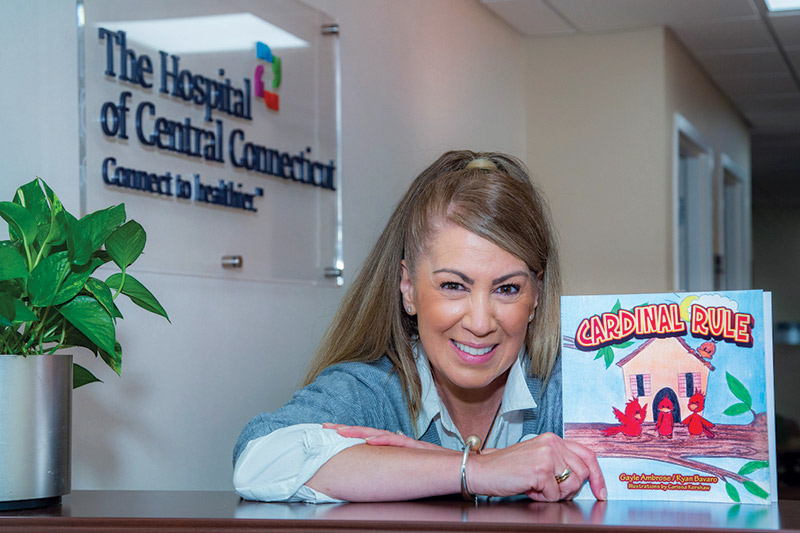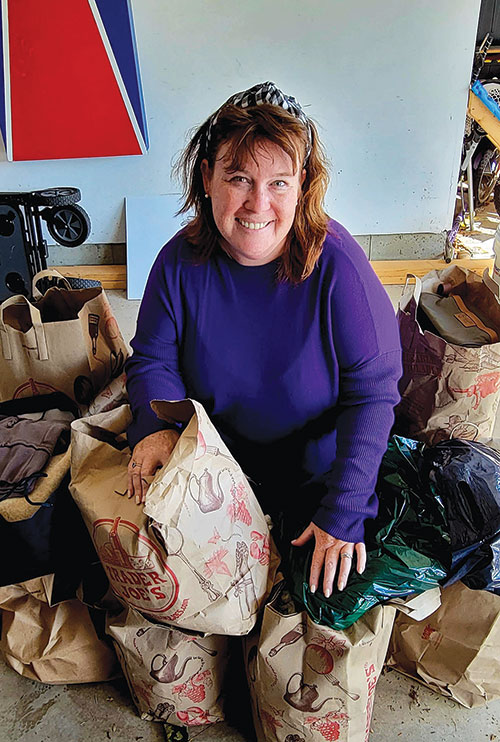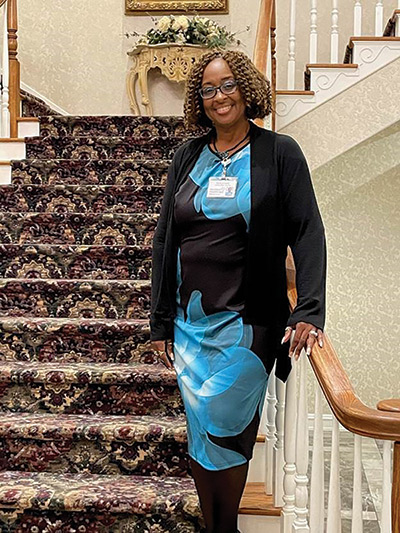Children’s Book Message: It’s OK to be Different
By Brian Spyros

Gayle Ambrose is the executive assistant to the vice president of operations and vice president of finance in the Central Region but she added another title to her resume last year — author.
Rewind to 2003, Ambrose was looking for a way to help her son, Ryan, after he couldn’t join the football team due to weight and age restrictions. She decided to use the painful experience as a teaching moment in a rather unique way — she wrote a book.
“I put a story together to help him emotionally,” Ambrose explains. “Kids may listen to bits and pieces of what we say as parents, but I figured with a book, it would be more impactful.”
The rough, handwritten book talked about positivity, inclusivity and accepting your differences, all through the eyes of two birds who wanted to be like their feathered friends instead of embracing their individuality. Ambrose’s niece illustrated the storyline, and Ryan got a kick out of the book.
“I ended up tucking it away in a box and it sat there for almost two decades,” Ambrose says.
She was going through boxes at home in 2022 when she came across the book. Her sister, who is battling breast cancer, encouraged her to get it published.
“My sister looked at me and says ‘What are you afraid of? Just do it!’” she laughs.
After connecting with a publishing company, Ambrose’s simple act of love became the book titled Cardinal Rule in July 2022.
“When I got the first published book, I was beside myself,” Ambrose recalls.
The book contains the illustrations her niece originally designed, a dedication to Ambrose’s sister and a write-up on Ryan, who is 30 and served in the Army for eight years before taking a job in the medical field.
Instead of calling the book a labor of love, Ambrose refers to it as a piece of her family’s history that sends children the important message that, despite obstacles and struggles, life always seems to work itself out. Most importantly, being true to yourself is all that matters.
“At the end of the day, if it can help one other child by making them realize it’s OK to be different, that was my goal all along,” Ambrose says.
Erica Moura’s Cup Runneth Over
By Elissa Bass
Long before there was a Purple Light Project, Erica Moura was a beacon of hope and comfort.
Growing up in Avon, “I was more focused on my social relationships than my academics,”she recalls. “I was the supportive best friend everywhere I went. Back to elementary school, I remember being the one who felt best when I could support others.”
It makes sense that she majored in psychology at St. Lawrence University, got a master’s in social work from Smith College, and launched a career in counseling and helping others. She was so focused on how others were doing, in fact, that it wasn’t until she got to Smith that academics spoke to her.
“That was my awakening,” she says. “They spoke my language for the first time in my life. That entire curriculum was my world. I understood who I was like I never had before.”
Today, Moura is director of human-centered care and patient experience for the Behavioral Health Network, and founder of the Purple Light Project, which provides support for mental health patients. Funded through donations, an annual auction and 5K, the program meets needs that make a difference in a patient’s recovery with such items as basic hygiene products, blankets, hats, food, school supplies and even hearing aids.
A suicide, a life change
After college, Moura took a job with an adult outpatient organization. She had a large client load of people with severe mental illness, and one died by suicide before she could even schedule their first meeting.
“It really rocked me. Should I have seen risk signs, should I have reached out sooner? It kept me up at night,” she remembers. “I felt like the system was setting me up. I didn’t feel I could adequately provide the services these patients needed and it scared me. I felt inadequate and ineffective, and there was no proper support for me.”
This critical moment led her to focus on supporting staff, including being part of a “post-vention” team at the BHN.
“If there is a suicide, I’m one of the people who will go sit with the staff who lost the patient and say, ‘I’m so sorry this happened. How can we support you?’” she says.
Starting at the Institute of Living in 2007 and deemed “warm and fuzzy” by Lori Johnson, APRN, director of the Assessment Center and director of behavioral health Care Logistics Center, she was placed in the children’s emergency department at Connecticut Children’s Medical Center, doing psych evaluations. She did that for 10 years.
Better able to help
Because of her desire to support staff, however, Moura earned an MBA from Western Governors University to go into administration, noting, “I think supporting staff is at the heart of improving our patient experience. The relationships make Hartford HealthCare so amazing.”
Armed with her third degree, she was named manager of Hartford Hospital’s Purple Pod in 2018. In 2020, as the mental health crisis exploded during COVID, she watched staff “dipping into their own pockets to provide things for our patients and I thought, ‘We can do better.’”
Thus, the Purple Light Project was born. In 2021 it was extended to all the system’s emergency departments. Moura also organized two Purple Light symposiums with speakers and continuing education credits for staff.
“I think Purple Light has been a space and platform to talk about the utter importance of mental health, and that there is not much difference between patients and staff. Humans are humans are humans,” Moura says. “My cup gets filled when I can connect with others. Bonus if I can be helpful. I’m most excited when I see teams come together and support each other.”

Turning Personal Struggle into a Career Helping Others
By Maggie Werner

Obese patients struggle with so many barriers, but the one that stands out most to Nickki Yopp is the demeaning way they are often treated.
It’s something she understands because, before bariatric surgery, Yopp struggled with her weight her entire life. Being in the shoes of the patients coming into the medical weight loss offices of Taslima Shaikh, MD, helped her be more gracious and compassionate in her role as a patient service coordinator.
A Hartford HealthCare colleague for 16 years, she transitioned from an acute hospital to the medical group for the position, bringing insight others may not have. In 2012, Yopp had bariatric surgery at Hartford HealthCare, but faced a 60-pound weight regain, which is common in bariatric patients.
Dr. Shaikh helped her address the regain through medical weight loss techniques, but it was not just about the results for Yopp, it was about the experience.
“I truly appreciated her considering my feelings and thoughts,” Yopp says.
Together, Yopp and the doctor reviewed her medication list, obstacles, prior failures and successes. At the end of the consult, Yopp left armed with information, new medication and suggestions for meal prep and exercise, all things she never expected.
“The entire time, she was engaged, smiling behind her mask and making me feel like my time was valuable and my health was her biggest concern at that very moment,” Yopp says.
Living through the discrimination many obese patients face, she continues, means she more easily recognizes their fears. She would openly let patients know she is a medical weight loss patient herself, hoping it eases their anxieties.
Since her consult, Yopp lost 57 pounds and continues to work on her goals. She also changed jobs, accepting a promotion to corporate executive administrative assistant at the medical group administrative building in Wethersfield. She still pledges, however, to share her positive experiences with other patients.
